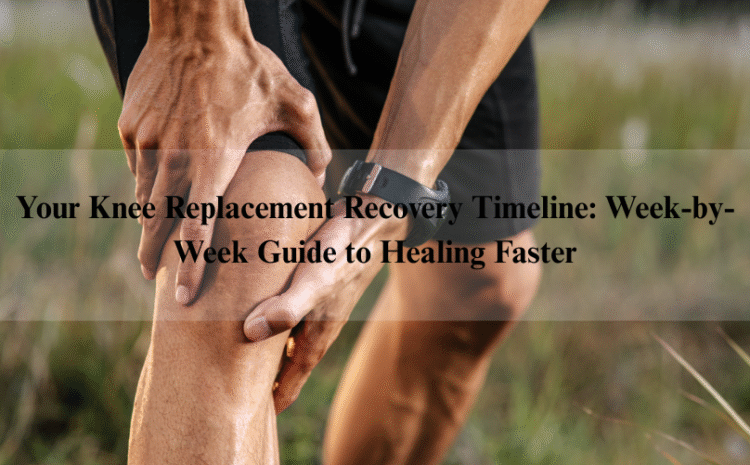
Knee replacement surgery is the most significant move towards regaining mobility, stopping pain, and enhancing one’s total well-being. Recovery is all about patience and persistence. Having week-by-week information regarding what to anticipate means that you have realistic expectations and are able to track your recovery in the best possible manner.
Regardless of whether you are looking for an orthopedic doctor in Thane or even a hip replacement surgery hospital in Mumbai, understanding the recovery phases makes rehabilitation simpler and quicker.
Week-by-Week Knee Replacement Recovery Timeline
The following is the week-by-week knee replacement recovery timeline:
Week 1: Immediate Post-Surgery Stage
The initial week after knee replacement is all about pain management, incision management, and initiation of small movements. You can have 3–4 days of in-hospital stay with your orthopedic team managing the critical signs, swelling, and wound healing.
- Pain Management: Pain and swelling are controlled by drugs and ice packs.
- Early Mobilization: Your physiotherapist assists you in initiating slow range-of-motion movements within 24 hours.
- Walk Aid: You may use a walker or crutches to walk for shorter distances, and this will assist in giving the blood movement and avoiding clotting.
- Goal: Bending the knee more than 90 degrees and advancing to weight-bearing with strict observation.
Week 2: Regaining Stability and Swelling Reduction
During week 2, you start the process of returning home from the hospital. Now the emphasis shifts towards regularity of exercises and dressing of wounds.
- Exercise Routine: Follow prescribed physiotherapy 2–3 times daily to develop muscle strength.
- Pain and Swelling Control: Rest the leg in the raised position and use compression stockings.
- Walking Distance: Progress walking distance at home with the support of a walking stick or walker.
- Home Modifications: Remove obstacles to prevent slipping and falling.
Week 3–4: Establishing Mobility and Confidence
By week 3, most patients are better with less stiffness and more control during walking. Your physiotherapist will likely be adding more difficult exercises.
- Muscle Strengthening: Include quadriceps, hamstrings, and calf muscle exercises.
- Gait Training: Emphasize even, smooth-step ambulation.
- Pain Reduction: Pain medication tapers to mild pain medications as healing continues.
- Daily Routine: Gradually return to light household activity or outdoor activity.
Week 5–6: Becoming Partially Independent
This is a phase of marked improvement in your progress. You will begin to experience increased flexibility of the joints, diminished pain, and greater stamina.
- Increased Range of Motion: Attempt a 110–120° knee bend.
- Balance & Endurance: Step-ups and supported squats are now included.
- Driving: After consulting your doctor, driving for short distances is allowed again.
- Hydrotherapy: Where appropriate, water therapy facilitates relaxation of muscles and more unrestricted movement.
Week 7–8: Functional Recovery and Strengthening
Two months after surgery, daily activities like walking, ascending or descending stairs, or light exercise become easier. This is when physiotherapy becomes more aggressive in terms of encouraging stability and control.
- Outdoor Mobility: Take short walks or perform light exercises.
- Strength Training: Perform core and lower limb strengthening with light resistance bands.
- Reduction of Swelling: Ice therapy follows after exercises to avoid swelling.
- Rehabilitation Achievement: Walking with or without support.
Week 9–12: Return to Normalcy
The focus during this phase is on going back to everyday life with a gradual return of strength and endurance.
- Activity Level: Progressive return to mild exercise such as long-distance driving or light gardening.
- Low-Impact Exercise: Swimming or cycling promotes joint mobility without stress.
- Physiotherapy Frequency: Decreased to 3–4 times a week as stability increases.
- Regular Follow-up: Regular follow-ups continue to monitor progress.
Months 4–6: Advanced Strength Training and Full Activity
By month four, you’re likely walking regularly, climbing stairs, and doing simple things on your own. The knee is more powerful yet still must avoid high-impact activities such as running or jumping until cleared.
- Advanced Exercises: Such as stationary biking and elliptical training for endurance.
- Core and Balance Training: Facilitates entire body posture and prevents falling.
- Pain-Free Movement: Most pain is gone, so confident movement is gained.
- Lifestyle Modifications: Physio, daily walks, and a healthy diet enhance joint health over the long term.
Long-term Results After 6 Months
The healing of the knee replacement is complete within 6–12 months. Regular follow-ups and following exercises ensure long-term results.
- Painless Mobility: The majority of patients walk, travel, and achieve things painlessly.
- Implant Life: New implants can last up to 15–20 years with good maintenance.
- Low-Impact Exercises: Yoga, swimming, and cycling are excellent for healthy knees.
- Knowledge Through Comparison: People who have undergone hip replacement surgery understand the importance of regular physiotherapy, posture alignment, and regular medical check-ups to ensure joint longevity.
Conclusion
Recovery from knee replacement is a task that demands perseverance, motivation, and professional care. With an experienced orthopedic doctor in Thane, every phase of recovery is professionally attended to, and personalized care is provided.
Likewise, patients who are operated on for hip replacement surgery in Mumbai can grasp the gradual, systematic process in an effort to become completely functionally independent.
Undergo joint replacement surgery by our best specialist doctors at Kaushalya Hospital, and receive advanced physiotherapy care and recovery support by top orthopedic specialists in the region.

